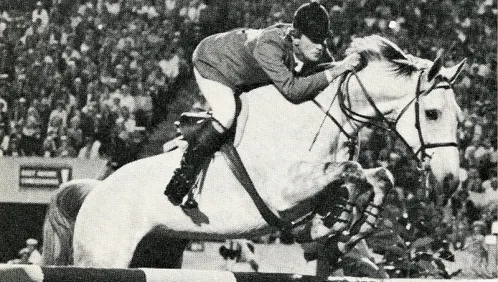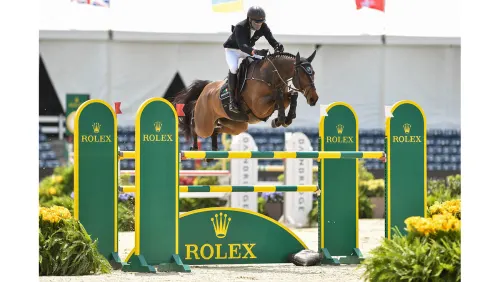August 6 — London.
The British show jumpers aren’t known for wild displays of emotion, but when Peter Charles jumped a clear round to secure the gold medal as the last rider to go in a thrilling jump-off against the Netherlands, Nick Skelton literally leaped into the air with joy.
He proceeded to sprint over to the podium and clamber up as soon as he dismounted from his horse for the medal ceremony—pretty good for a man who has broken his neck, had two knee surgeries and needs to schedule back surgery in the near future.
“I’ve waited a long time and been to a lot of games. I’ve made a lot of mistakes. You couldn’t do it in a better place than London for us,” said Skelton, who is 54.
Team USA’s day ended on a more somber note. No rider could manage a clear, with Beezie Madden turning in the best performance, 4 faults with Via Volo. McLain Ward on Antares and Rich Fellers on Flexible had two down apiece, while Reed Kessler finished with 12 faults on Cylana for a tie for sixth place with Sweden.
Course designer Bob Ellis heard a little bit of flack on the first day of jumping when 32 riders jumped clean of 75. But by Day 3, clears were few and far between, with only six riders out of 45 jumping fault free.
The Saudis, who led after the first round of team competition, had to be content with bronze when each rider incurred 4 faults.
But for the Brits and the Dutch, it came down to a jump-off for gold. The two teams came into the second team round tied on 4 faults. They switched the lead back and forth as each rider went, but by the end they were still tied, now on 8. Nick Skelton kept delivering clear rounds for Team GB aboard Big Star, while Maikel van der Vleuten on Verdi and Marc Houtzager on Tamino added no penalties for the Dutch.
So it came down to a jump-off for the team medals. In normal Nations Cup competition, only one rider need jump off to determine the winner, but at the Olympic Games all four had to race the clock.
First in the ring, Nick Skelton continued his remarkable streak, clocking what would be the fastest trip of any rider at 47.27 with Big Star. Then came Jur Vrieling on Bubalu. Although Vrieling had been the drop score in the previous rounds, he rose to the occasion for the Netherlands and laid down a clear on 48.54.
Then it was Ben Maher on Tripple X against van der Vleuten. Maher left out a stride at the last fence, the 1.6-meter Tower Bridge vertical, but he cleared it. Maikel, who had incurred no faults until then, fell victim to speed and had two down.
But then Scott Brash had the second fence down with Hello Sanctos for Great Britain. Marc Houtzager went for the slow clear with Tamino and got unlucky when the second fence fell in the double combination.
Last for Great Britain was Peter Charles. The former Team Ireland rider had been having a rough week with Vindicat and was the drop score in both rounds of team competition. But he delivered under pressure, putting in a careful clean to clinch the victory regardless of how Gerco Schroder might’ve performed with London.
ADVERTISEMENT
“I was very keen to get the job done and not let the lads down,” said Charles. “I came in last the first day, and [Vindicat] just freaked out with stamping of the feet and the clapping. He just froze on me a little bit. He didn’t want to canter. He didn’t want to go forward. He didn’t want to go backwards. He was really spooked by all the reception we got. That’s not a criticism of the people. It’s just an observation that happened to me in the ring. We got into a right mess. We had to sort that out a little bit in the ring yesterday. He was very nearly clear today, and he was great in the jump-off.”
The Greatest Moment
“We lost it, we won it, we lost it and then finally we won it back,” said Skelton. “I know that without this crowd we could never have done it. People said that riding in an Olympics at home would add pressure, but it was totally the opposite. It has to be my greatest moment in front of all these people.”
“This is the best day of my life. It’s the best day of all our lives,” agreed Brash. “I don’t think you ever get a better day in your life with your home crowd behind you.”
Great Britain hasn’t won team gold in show jumping since 1952, and fellow show jumper Robert Smith had called the team prospects besides Skelton “mediocre” in a controversial interview done in April.
“We did pretty well with a mediocre bunch,” said Skelton with glee.
All the British team besides Charles prepared over the winter in Wellington, Fla., at the FTI Winter Equestrian Festival thanks to lottery funding.
“Wellington is an amazing place. The arena is similar. That’s what I was trying to emulate for my horse anyway,” said Maher. “It’s a big sand arena, and there’s big jumping competition in Florida. Some think the jumping is not as strong, but if you’re there, it’s probably the strongest competition in the world. If you want to be the best, you’ve got to be riding with the best. I think for my, Scott and Nick’s horses, it proved that it was a good preparation.”
The Dutch team was disappointed but philosophical about their silver medal. “We had a really good team. We were mentally ready for it. We were going for gold from the beginning,” said Vrieling. “We were all in a good mood, and we wanted to win gold, but we were very happy to win silver.”
“We knew the English riders were always quick in a jump-off,” said team coach Rob Ehrens. “Our first plan was to ride quickly but not overdo it and try to keep the score on zero. That was our plan. It didn’t work out really the way we wanted it to be. It was exciting.”
The riders from Great Britain and the Netherlands will have the chance to duke it out again in the individual competition on Aug. 8. Skelton, Maher and Brash will ride for Team GB, while van der Vleuten, Houtzager and Schroder will represent the Netherlands. Only the top three riders from any one nation may contest the individual final, and all riders will start again at zero.
Historic Result
The Saudis were thrilled to be third, the first time that nation has won a team medal at an Olympic Games in show jumping.
ADVERTISEMENT
“We had one focus in mind: the Olympic Games. We worked hard all year to try to get the horses ready at the time of the Olympics,” said Ramzy al Duhami, who trains in Belgium with team coach Stanny van Paesschen and had 4 faults total over the two rounds with Bayard van de Villa Theresia.
Kamal Bahamdan, who rides with Jan Tops in the Netherlands, said a newly established Saudi Equestrian Fund helped purchase the best horses for the Saudi riders. “That was started in Saudi under the supervision and the support of his majesty, the king. That program helped bring the private sector in Saudi into the sport to help with buying the horses and the management of the training,” he said.
One of those horses was Davos, who HRH Prince Abdullah al Saud rode to a 4-fault total combined score. Candice King brought the 12-year-old Zangersheide gelding (Carthago Z—Aida, Pericles XX) to the top levels and campaigned him with good results at the grand prix level, including being the reserve rider for the U.S. team at the 2010 Alltech FEI World Equestrian Games (Ky.) before he was sold last spring.
The U.S. team couldn’t catch a break over the biggest and most technical course of the competition. Ward had an unlucky rail at fence 2 when Antares chose an inopportune moment to take a bathroom break. They also had the middle oxer down in the triple. However, Ward is still eligible to ride in the individual competition with the 12-year-old Wurttemberger gelding (Araconit—Zuchtbuch Caprice, Cento).
“It wasn’t the leadoff ride I was hoping for,” said Ward, 36. “My horse didn’t jump badly, but not good enough. At this level, it’s just not a good enough performance, and unfortunately the rest of the team went the same way.
“Certainly I am disappointed in the result,” he continued. “My first focus here was on the team. We’ll wake up tomorrow morning and have a fresh outlook and move into the next round. My horse has all the ability to jump the fences, and we will refocus.”
Madden said Via Volo felt great, and she thought the course was quite difficult, particularly the line at 3, 4 and 5. Riders completed a rollback turn off the right to 3, a 1.5-meter oxer with a 1.75-meter spread. Then it was five forward strides to the open water before coming back on a balanced six in a straight line to an airy 1.6-meter vertical.
“The fences are closer together. The line across the middle is very technical with several different options. The last three jumps are plain old big at the end of the course,” said Madden.
The 14-year-old Belgian Warmblood mare (Clinton—Run Away, Heartbreaker) had the Maritime Navigation oxer at 11 down. “I opted to do four after the double to the vertical [the distance from 9B to 10 was either a forward four strides or a holding five], and that probably got her a little flat and aggressive to start with,” said Madden. “I probably needed to reel her in a little more. I was thinking of the time allowed and knowing I didn’t want to get too flat there, so I didn’t get there in a good frame. I was fighting her a little bit, and then she was going at the fence.”
Kessler appeared to be the victim of her own inexperience, racking up faults at the open water at 4, the vertical directly after it and the last fence.
“I really would’ve liked to have turned out a clear round for my team, seeing as that is my last round since I didn’t qualify for the individual,” she said. “ But I’m pretty happy. I am 18 years old, and it’s my first major championship. I am pretty happy to have three solid performances under a great deal of pressure. I am excited to be here with these amazing riders. God willing I will do a lot of these, so it just drives my hunger to get ready for the next one.”
Fellers thought Flexible might’ve gotten a little bit tired. The 16-year-old Irish Sport Horse stallion (Cruising—Flex, Safari) had the vertical at 6 down and then took a rail at 8, Nelson’s Column, which had a spread of 1.8 meters.
“The early rail he had down was just a light touch behind. The second one he had down was a bit of a mistake on my part,” said Fellers. “I was coming a little closer than I wanted to the hedge oxer, and it was quite a wide fence, the widest on the course. I stepped on the gas pedal a little hard off the ground thinking about the back rail and disregarding the front rail, so he ran into it a bit there. He finished up great. It will be nice to give him a day of rest. I think he’ll come back really good on Wednesday for the individual.”
For full results, visit the London 2012 website.















